Sabrent Rocket 4 Plus 2TB PCIe 4.0 M.2 SSD Review
With the same capacity and compatibility and as the previously-reviewed Cardea A440 Pro Special Series, the lack of a graphene heat spreader may be the second biggest thing to differentiate Sabrent’s high-end 2.0TB Rocket 4 Plus from its T-Force competition…after price: While the Rocket 4 Plus is currently selling for $300, the competing T-Force model is priced as low as $250. We expect this to change when the Cardea-model’s temporary online discount expires.
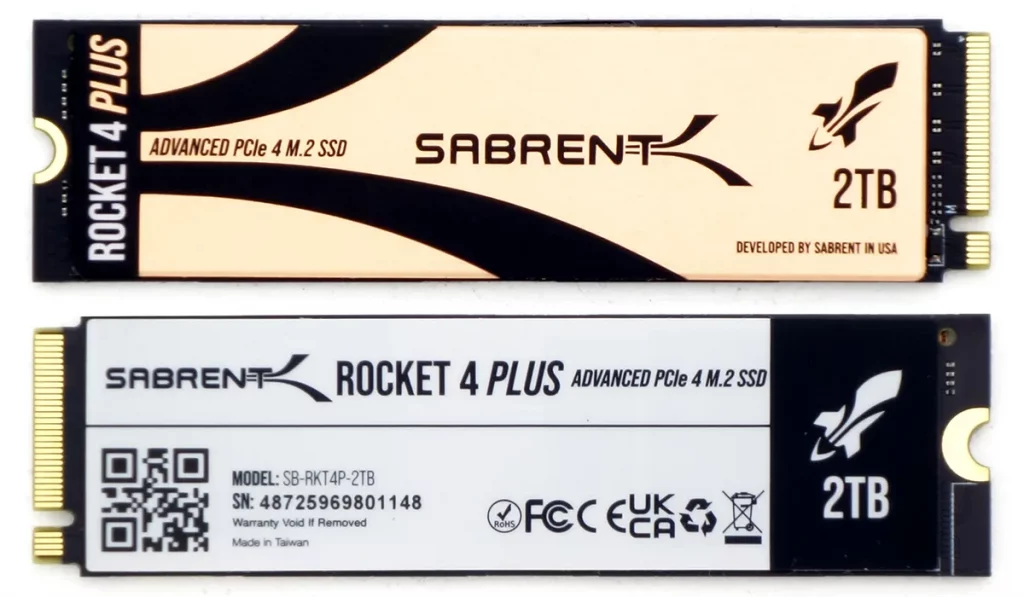
Get it at Amazon

(click for availability)
The lack of a sticker-thin heat sink isn’t the only difference in package contents, as Sabrent ships its part number SB-RKT4P-2TB SSD in a tin. That might occasionally be a little more significant than you think since we once damaged an M.2 drive while trying to pry it from its plastic tray. Still, we won’t discount the value of a thick sticker, particularly when it’s primarily composed of graphene-lined copper.
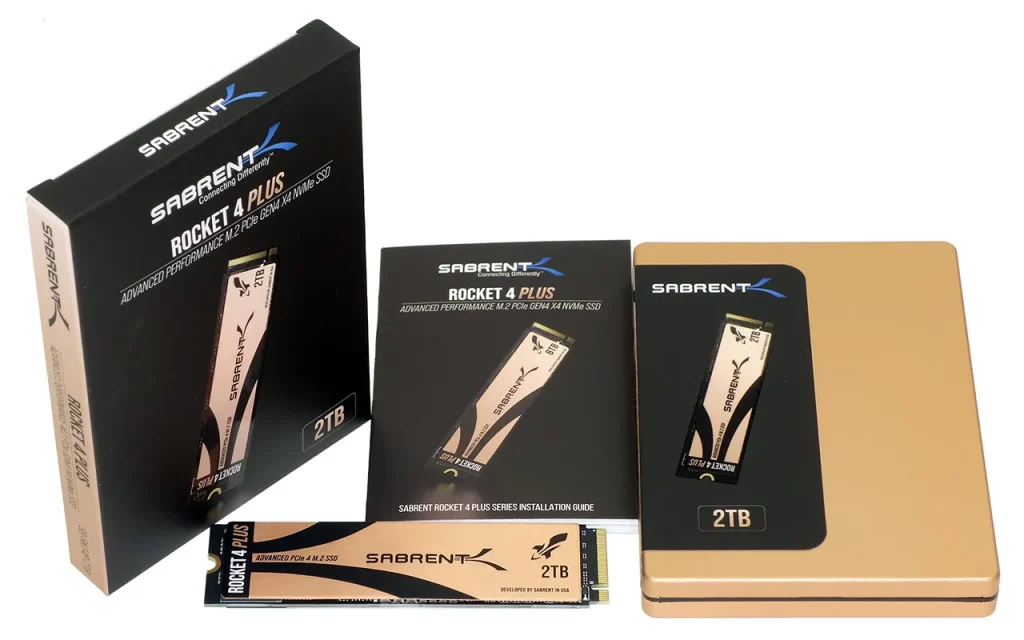
It’s not as though Sabrent doesn’t offer any cooling solution: The copper-colored sticker appears to be made of the same real copper as we previously saw on its DDR5 DRAM, and our flashlight shows that it covers the Phison controller even if it doesn’t have the same graphene coating on its underside. Better still, those who watched these things would have found a $250 bundle pairing the $300 Rocket 4 Plus with the company’s gigantic $25 heat sink back in August. While that particular discount has expired, who could have passed up $75 in savings when it was active?

Hearing that PCIe 4.0 NVMe drives run hot enough to show a performance degradation when installed without any cooling apparatus left us with a conundrum: We’ve already tested the Cardea A440 PS5 with nothing more than its graphene-coated sticker-type heat spreader on one side, and since the Rocket 4 Plus also has a copper heat spreader on one side, we decided to test it without the giant add-on component.
| Sabrent Rocket 4 Plus SB-RKT4P-2TB | T-Force Cardea A440 PS5 TM8FPY002T0C129 | |
| Form Factor | M.2 2280 | M.2 2280 |
| Capacity | 2.0TB | 2.0TB |
| Flash | Micron 96L TLC | Micron 176L TLC |
| Interface | PCIe 4.0 x4 (NVMe 1.4) | PCIe 4.0 x4 (NVMe 1.4) |
| Controller | Phison PS5018-E18 | Phison PS5018-E18 |
| Cache | DRAM | DRAM |
| Endurance | 1,400 TBW | 1,400 TBW |
| Warranty | 5-years | 5-years |
| Price | $300 | $250 |
Unless one of the drives thermal throttles, it appears that today’s contest will boil down to the performance difference between Micron’s 96-layer and 176-layer NAND. The denser stuff is supposed to be faster, but using only half as many chips to reach the same 2TB capacity could diminish that advancement.
| Test Hardware | |
| CPU | Intel Core i9-12900K, Fixed at 4.8/4.0GHz, 1.275V |
| CPU Cooler | Alphacool Eisblock XPX CPU, VPP655 with Eisbecher D5 150mm, NexXxoS UT60 X-Flow |
| Motherboard | ASRock Z690 Taichi LGA 1700 |
| Graphics | Gigabyte GeForce RTX 2070 Gaming OC 8G: 1410-1725 MHz GPU, GDDR6 |
| Power | be quiet! Dark Power Pro 10 850W: ATX12V v2.3, EPS12V, 80 PLUS Platinum |
| Memory | Patriot Viper Venom RGB DDR5-6200 C40 2x 16GB (32GB) Kit |
| Sound | Integrated HD Audio |
| Network | Integrated Wi-Fi |
| Graphics Driver | GeForce 496.49 |
We used ASRock’s Z690 Taichi to provide the NVMe 4.0 interface for these recent M.2 SSDs.
Benchmark Results
Remembering that the Rocket 4 Plus uses older less-dense NAND, it looks like more ICs (Rocket 4) beats faster ICs (Cardea A440) in Sandra.



AIDA64 prefers the newer A440 for bandwidth, but also showed the Rocket 4 Plus with lower access time. The later metric tends to be less consistent.



3DMark’s storage benchmark also shows preference for Sabrent’s configuration, but PCMark gives the A440 reprieve at least in its Quick Test pattern, which uses smaller files.
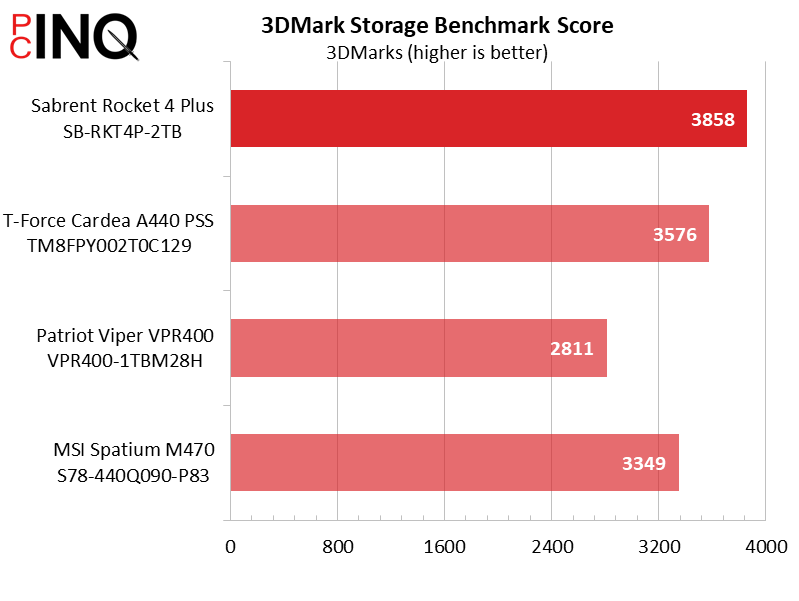





ATTO shows the Rocket 4 Plus performing optimally in 128K transfers, while the A440 Pro Special Series takes the lead at 4k.

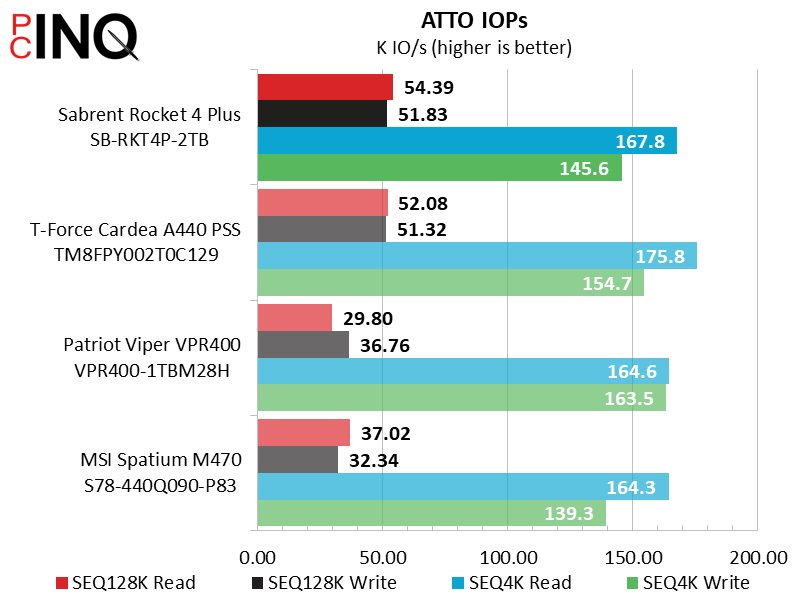
CrystalDiskMark shows a strangely larger lead for the Rocket 4 Plus’s Random 4k reads, but the A440 PS5 wins in random 4k writes.



DiskBench simply transfers the tester’s choice of file, compares its MB to the number of seconds it took to complete, and outputs a MB/s detail. The Rocket 4 Plus 2TB moved our 30GB file a bit faster than anything else.
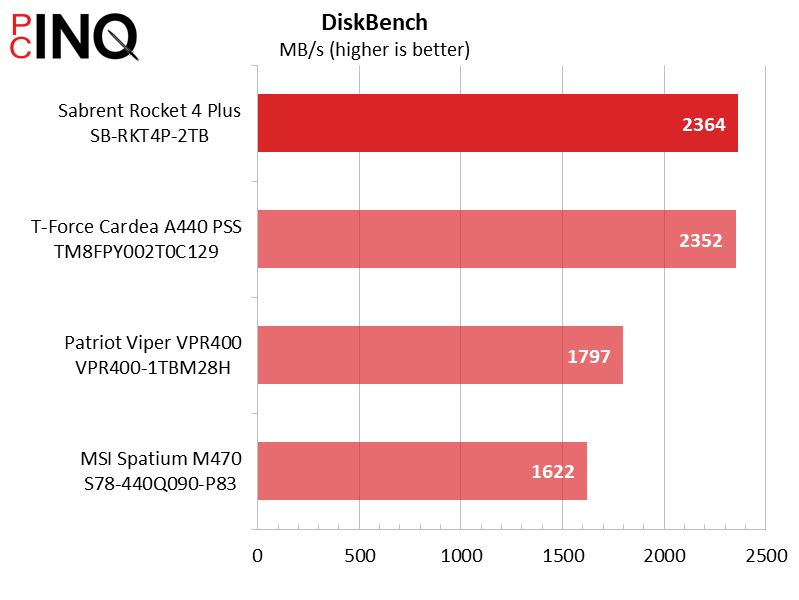
3DMark does a great job of estimating game file performance and PCMark does a similarly excellent job with the files needed for various programs, with the former favoring the Rocket 4 Plus b a wider margin and the later favoring the A440 PS5 by a narrower margin. Sabrent wins the overall performance contest.
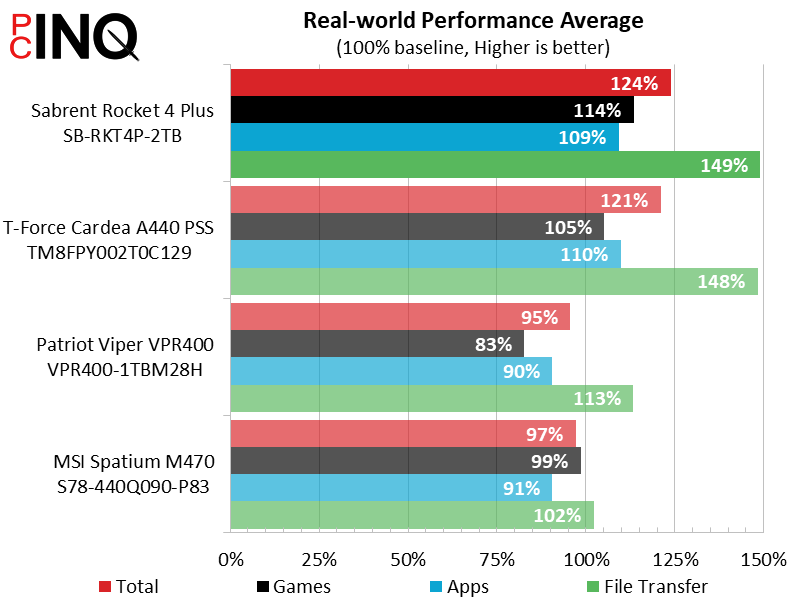
We didn’t see any benchmark slowdowns that would have indicated thermal throttling from our tests, but our tests may have lacked a certain combination of difficulty and length that would have been needed to reach that point. At any rate, the older-tech Rocket 4 Plus beats the newer tech A440 PS5 when handling larger file, and only occasionally slips behind it when the load contains smaller files.
We could have easily handed the Rocket 4 Plus a value award when its faster-overall came at the same price as the A440 PS5, but today’s buyers are forced to consider budgetary restrictions against performance expectations. Too expensive to excuse, the Rocket 4 Plus 2TB assumes the previous victor’s Approved position by being too fast to ignore.
| Sabrent Rocket 4 Plus | |
| Pros | Cons |
|
|
| The Verdict | |
| The Rocket 4 Plus uses twice as many ICs at half the density to brute force its way to 2TB performance supremacy. | |
Anyone hoping to excuse Sabrent’s higher price could point to its inclusion of Acronis True Image as extra value, but determining that extra value just became more difficult since the producer of this software is redirecting its attention to cloud storage.

